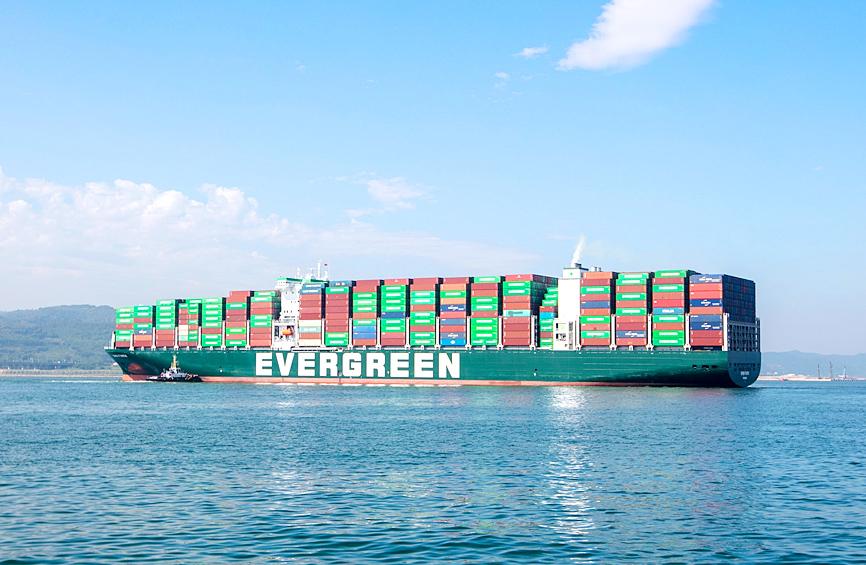Evergreen Marine Corp (長榮海運) yesterday disclosed its ship recycling policy as it joined the Ship Recycling Transparency Initiative (SRTI), which comprises firms that value its environmental, social and governance objectives.
The SRTI, launched in March 2018 and hosted by the Sustainable Shipping Initiative, a UK-based nonprofit organization, aims to accelerate responsible ship recycling practices by asking its members to share their policies on the platform so that the public can view them, Evergreen said.
Evergreen is the first Taiwanese shipping company to join the initiative, as well as the 11th shipowner member, following founding members such as China Navigation Co Pte Ltd (太古輪船), A.P. Moller-Maersk A/S, D/S Norden A/S, Hapag-Lloyd AG and Wallenius Wilhelmsen Logistics ASA, it said.

Photo courtesy of Evergreen Marine Corp
Evergreen — Taiwan’s largest shipping company by fleet size — last year implemented a ship recycling policy, which adheres to the EU Ship Recycling Regulation and the Hong Kong International Convention for the Safe and Environmentally Sound Recycling of Ships, it said in its disclosure on the SRTI platform.
Evergreen requires the buyers of its decommissioned vessels to guarantee that the aged vessels are demolished rather than sold to be used second-hand, while vessels can only be recycled at shipyards that are certified by the International Organization for Standardization and are recognized as a “Green Ship Recycling” shipyard by the Hong Kong convention, it said.
When a vessel is decommissioned and recycled, not only can valuable and reusable resources such as steel be recycled, but waste and pollutants that could be dangerous to people and the environment must be processed properly, Evergreen said.
Evergreen’s pro forma contract contains a liquidated damage clause, which helps deter any ill-disposed buyer from doing anything that would contravene it, the company said.
Buyers need to provide reports weekly at least on the vessel’s recycling process to show that their practices are safe and environmentally sound, Evergreen said.
The company, which operates a modern fleet of about 190 container ships with a combined capacity of more than 1.2 million twenty-feet equivalent units, said that nine of its vessels have been recycled based on the policy.
Evergreen said it has a long-standing commitment to keeping the ocean clean, and aims to ensure responsible and sustainable operations.
Joining the SRTI would likely attract more international clients that value the environmental, social and governance objectives, as they prefer shipping firms that are SRTI members, it added.

TECH BOOST: New TSMC wafer fabs in Arizona are to dramatically improve US advanced chip production, a report by market research firm TrendForce said With Taiwan Semiconductor Manufacturing Co (TSMC, 台積電) pouring large funds into Arizona, the US is expected to see an improvement in its status to become the second-largest maker of advanced semiconductors in 2027, Taipei-based market researcher TrendForce Corp (集邦科技) said in a report last week. TrendForce estimates the US would account for a 21 percent share in the global advanced integrated circuit (IC) production market by 2027, sharply up from the current 9 percent, as TSMC is investing US$65 billion to build three wafer fabs in Arizona, the report said. TrendForce defined the advanced chipmaking processes as the 7-nanometer process or more

China’s Huawei Technologies Co (華為) plans to start mass-producing its most advanced artificial intelligence (AI) chip in the first quarter of next year, even as it struggles to make enough chips due to US restrictions, two people familiar with the matter said. The telecoms conglomerate has sent samples of the Ascend 910C — its newest chip, meant to rival those made by US chipmaker Nvidia Corp — to some technology firms and started taking orders, the sources told Reuters. The 910C is being made by top Chinese contract chipmaker Semiconductor Manufacturing International Corp (SMIC, 中芯) on its N+2 process, but a lack

Who would not want a social media audience that grows without new content? During the three years she paused production of her short do-it-yourself (DIY) farmer’s lifestyle videos, Chinese vlogger Li Ziqi (李子柒), 34, has seen her YouTube subscribers increase to 20.2 million from about 14 million. While YouTube is banned in China, her fan base there — although not the size of YouTube’s MrBeast, who has 330 million subscribers — is close to 100 million across the country’s social media platforms Douyin (抖音), Sina Weibo (新浪微博) and Xiaohongshu (小紅書). When Li finally released new videos last week — ending what has

OPEN SCIENCE: International collaboration on math and science will persevere even if the incoming Trump administration imposes strict controls, Nvidia’s CEO said Nvidia Corp CEO Jensen Huang (黃仁勳) said on Saturday that global cooperation in technology would continue even if the incoming US administration imposes stricter export controls on advanced computing products. US president-elect Donald Trump, in his first term in office, imposed restrictions on the sale of US technology to China citing national security — a policy continued under US President Joe Biden. The curbs forced Nvidia, the world’s leading maker of chips used for artificial intelligence (AI) applications, to change its product lineup in China. The US chipmaking giant last week reported record-high quarterly revenue on the back of strong AI chip